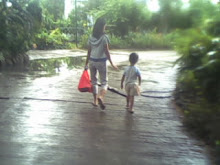Nursing Informatics
By Yara Ilul BSN 2C
Increasingly, the world of nursing is being impacted by technological
change. As one commentator put it, "In today's Information Age, nurses are expected to keep pace with the rapidly advancing technology."
As health care organizations adopt information technology to improve quality and patient safety, reduce errors, increase efficiency, decrease time-consuming and redundant paperwork, and enhance communication, they’re finding that IT can significantly impact nursing workflow.
In discussing how nursing education is being influenced by "rapidly changing technologies and dramatically expanding knowledge," and how "students must learn to acquire, apply, and evaluate new knowledge. The importance of information skills, listing "information seeking, sorting and selection" as third among nine essential cognitive curricula areas.
Nurses are seen as being at "the hub of the information flow between patients and the health care system. Charting is being automated, as are patient care plans. Work is proceeding on developing a Nursing Minimum Data Set. While critical thinking is key to evidence-based nursing practice, it is also true that information access and information technology skills are also essential.
Nursing informatics is the term that is used to describe the cross-functional interrelationship between nursing concepts, and information resources and technology. Over the last 5 years or so, the term has evolved to have two basic meanings.
1. Refers to the broad needs that all nurses have to be information savvy -- to be able to use information access tools information technology resources and computerized systems on the job. This is the most common meaning. As with other occupational programs, nursing faculty is scrambling to incorporate nursing informatics into regular coursework.
2. It identifies content, flow, and the processing of patient information in the hospital. The context is the nursing process, and the role of the nurse as the gateway for patient information. Students see the ways in which information technology influences and facilitates collecting, processing and communicating information.
Internet is an ocean of information as they say. Using an Internet Web browser proficiently. It is also good to have a general notion as to how a network works...not the technical aspects, but a general familiarity with the concepts is very helpful. All modern healthcare computer systems are networked.
You take the knowledge explosion, the growth of the Internet, and the public's increased awareness of and participation in their own health decisions and you can see that nurses must stay current. It's becoming more and more the nurse's responsibility to know how to advise patients on how to access information that is credible and relevant for them.
If you're already a nurse, you have to have on-the-job training; and be sure to go to all those workshops and seminars that get offered in your area. Technology moves so fast that it is hard for older nurses who have been on the job for a while.
Nursing is affected greatly by the Information Age. Computers are at bedsides in many hospitals. A basic understanding of search tools is imperative. Much of nursing charting is now done electronically. If you're thinking of becoming a nurse, it's very important to take courses in Windows, Word, Excel, and Internet searching. These are now basic skills for nursing personnel.
In intensive care nursing nurses abroad couldn't live without computer charting (or computerized information management, as we prefer to call it) anymore! There is hardly any paperwork (decoding bad handwriting is history!). Of course, it takes time to use the pc, but as it is situated right next to the patient's bed, It seems that a nurse will be always there for her patient.
At a hospital, patients' rights are posted in the lobby. One of the rights is to receive information about your illness, course of treatment, and prospects for recovery in terms the patient can understand. As a nurse, that often comes down to being your responsibility. In today's world, you need to be comfortable doing Internet searches for information that patient can read and understand.
In an ideal nursing facility now, they use the Meditech system. In my opinion, not only would we be lost without it, but we would also become less efficient. These systems have helped our profession in caring for our patients. We would be able to do nursing care plans, nurse notes, get lab, X-rays and other test results returned much faster than if they were done manually like they used to be.
This is a COMPUTER WORLD we live in. Like other professions, nursing is using more and more technology. Oftentimes, it comes down to how good are you at finding the online information you need -- when you need it?
With the move toward paperless medical facilities, today's nurse simply must be computer-literate; and people around here talk about being information-literate, so that, too! So much communication among and between departments is done through hospital-wide networks. More often than you might think, there you are using a browser and a search tool on the Internet looking for information to help your patient understand their condition. (I think there's going to be more of this in the future, frankly.) If they're already on the job, nurses often have to educate themselves. That’s nursing informatics.
Subscribe to:
Post Comments (Atom)

No comments:
Post a Comment